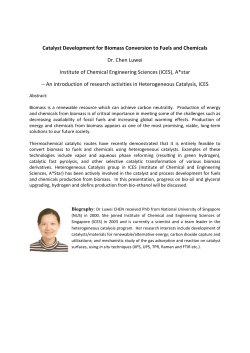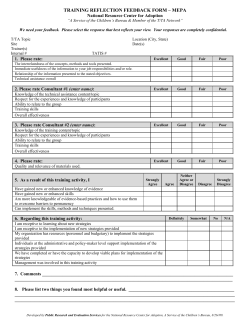
WMI-Research call-wPOWER-Research
UNIVERSITY OF NAIROBI COLLEGE OF AGRICULTURE AND VETERINARY SCIENCES WANGARI MAATHAI INSTITUTE FOR PEACE AND ENVIRONMENTAL STUDIES Research Scholarships Available – Call for Applications Partnership on Women’s Entrepreneurship in Renewable (wPOWER) Overview The wPOWER hub, Wangari Maathai Institute, through this Request for Proposals (RFP), invites research concepts from applicants interested in receiving research support for their project/thesis for a Masters Degree at the University of Nairobi. From the submitted Concepts, at least three to five applicants will be invited to submit a full proposal, which, if accepted, will lead to award of research funds for the project. The research work will be expected to provide high quality evidence-based information on successful adoption, knowledge, attitudes and barriers towards clean energy technologies, and the role of womens' entrepreneurship in advancing clean energy adoption. The role of women in addressing energy access and affordability is undeniable. Women are a critical force in sustainably managing natural resources and increasing energy access, which ultimately helps to combat climate change as well as improve livelihoods and community health. Women also remain the primary users of smallscale efficient and clean technologies and perhaps determine the adoption rates of various related technological options. Given this situation, the prospect of increasing energy access and driving green growth through direct integration of women in the energy access value chain is strong. However, there are currently several barriers which hinder the full integration of women into the value chain. Some of these barriers may include low access and awareness, financial constraints, cultural barriers and poor marketing strategies. It could also be that the technologies that exist today or are emerging do not address the multiple needs of a cooking/fire place. 1 wPOWER Hub- Wangari Maathai Institute How to apply For the purpose of this request for proposal, the Institute requests that the applicants focus their concepts on any of the following issues. A. Gender dimension: Establish the gender dimensions in drivers of clean energy technologies development and use. Who is involved in developing what technologies and why? Establish also whether adoption of clean cookstoves or even solar lighting is based on gender or otherwise and why some technologies are preferred to others. The project seeks to understand the gender impacts of household clean energy technologies adoption cooking and lighting - as well as the roles women play across the clean energy value chain and the associated impacts. B. Availability of Clean energy technologies: Mapping of the existing clean energy technologies - cookstoves, fuels and small home system solar lighting- types around the country. There is the need to conduct comprehensive mapping on the available technologies and also establish what else exists in the communities that may need adoption, upscaling or even value addition. This may also help us to understand or even explain the low adoption rates for some of the newer technologies. The mapping of the existing clean energy technologies could benefit from some secondary data that is already in existence. Awareness and marketing strategies: Awareness creation and information sharing on the impacts of clean energy technologies has been inadequate and is a critical research area of concern. These areas of study can be integrated into consumer financing models, messaging and marketing techniques and attitudes as well as knowledge around clean energy technologies. The information gained would be relevant in devising awareness raising campaigns and marketing strategies. C. D. Culture, Attitude and behavioral changes: There is need to consider establishing the linkages between adoption and cultural issues, as well as the value the communities attach to each of the benefits associated with traditional cook stoves vise a visa improved cook stoves. Some investigations elsewhere had indicated that women were resistant to adoption of some relevant technologies because they felt that the time spent fetching wood is an important social exercise where they interact and share with their friends. There is even anecdotal evidence that there are cultural values attached to the traditional three-stone stove common in many Kenyan homes. There is need to understand the existing technologies among various Kenyan communities and their linkages with cultural beliefs .The research may also explore the nexus involving energy, food and nutrition security. E. Biomass fuels, their availability and switching factors: Inefficient lighting and cooking contribute to greenhouse gas emissions, global warming, and climate change, as well as degradation of natural resources such as trees that are cut to provide cooking energy. Smoke from inefficient cooking, lighting, and heating devices kill’s nearly four million people every 2 wPOWER Hub- Wangari Maathai Institute year globally, primarily women and children. Adoption of clean energy technologies helps in reducing adverse health, environmental and climate impacts. Depending on the locality and the choice of domestic source of energy -urban, peri urban or rural - households are hesitant to adopt technologies and fuels that are less convenient to them. The study will help analyze why the biomass fuels remain as the prevailing energy choice in 90% of households in Kenya, the biomass energy value-chain and its associated challenges, types of fuels availability visa a vies factors that contribute to switching from traditional fuels, transition fuels and advanced fuels. The energy ladder displays the use of energy versus income levels dependent on emissions, efficiency and safety. However, experience has shown that communities do not follow the typical energy ladder hypotheses, but as income grows, the biomass remains still important component of the portfolios while households diversify options. The research questions in this segment could include but not exclusively: What factors influence the choice of biomass fuels? What are the level of awareness of types of fuel used and climate change; types of fuels used and health? To what extent does fuels availability determine the type of stove to use? How does this vary in rural, peri-urban and urban settings? More data on these questions would held in understanding economic, cultural, gender, and other key factors affecting the energy choice by households of different socioeconomic strata (along with urban vs. peri-urban vs. rural), and would help predict the trajectories of how much biomass still play importance in household energy provision, which will really guide policy debates for sustainable biomass, rather than expecting the complete replacement of it by “modern” energy Concepts should be no longer than three (3) pages in length. The concept should provide the title of the project, the proposed supervisors, the specific issue the study is addressing and the expected outcomes, the timelines and the summary of the budget required to carry out the study Evaluation Responses will be evaluated against criteria that include: Overall outline approach; coherence and relevance of proposed work plan Costs of the project Feasibility of the project in the time available Any additional evaluation criteria that the Institute considers relevant The relative weighting and priority of these criteria will be at the wPOWER hub’s discretion. Applications must be completed and submitted electronically to the following e-mail address (wmi@uonbi.ac.ke) Deadline for application is 19th June 2015. Selected candidates will be invited for interview on 29th June 2015. 3 wPOWER Hub- Wangari Maathai Institute 4 wPOWER Hub- Wangari Maathai Institute
© Copyright 2025










